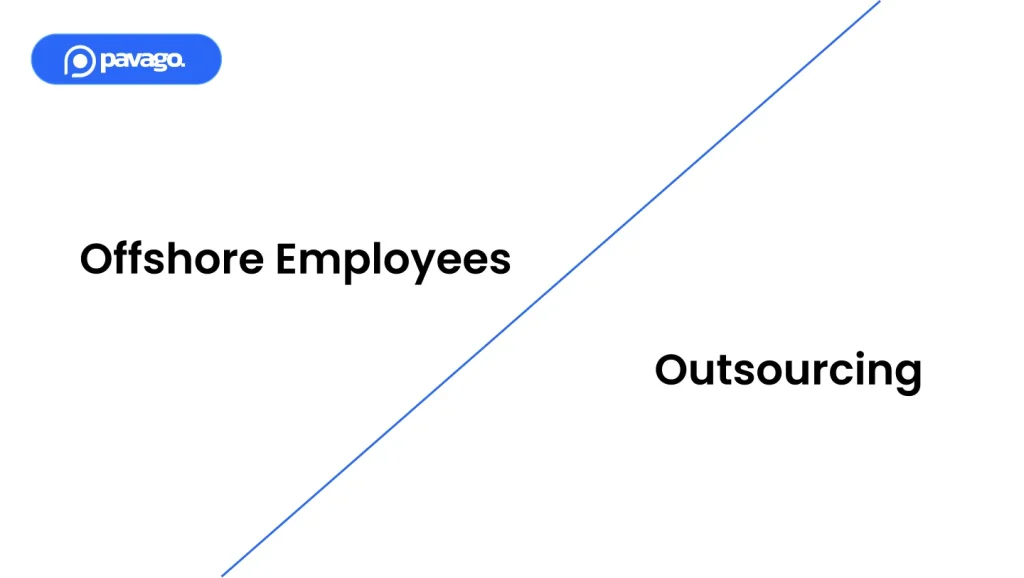After the pandemic, the business environment has become more globalized, and small to medium-sized businesses (SMBs) are increasingly looking beyond borders to optimize operations and reduce costs.
Two of the most popular strategies are hiring offshore employees vs. outsourcing services. However, these approaches are often confused with each other. Understanding their differences and knowing which to choose can make a significant impact on your business’s success. This article will explore both options to help you make an informed decision.
What is the Difference between Hiring Offshore Employees and Outsourcing?
Offshore hiring refers to hiring international employees in a foreign country where the cost of living is comparatively lower than in the US, such as Pakistan, India, Latin America, etc. These employees work directly for your company and are integrated into your organization just like your local staff, although they work remotely.
The primary motivation behind offshore recruitment is cost savings, as wages in some countries are significantly lower than in others. For instance, at Pavago, we help SMBs to hire top talent starting from a $1000/month salary. Don’t get me wrong, low wages don’t mean you’ll get poor quality. We never compromise on the quality. That is why we have a rigorous recruitment 3-step process so that we can source the best candidates for you.
Research shows that offshore outsourcing is set to soar to $38.24 billion by 2027, with a robust 12.3% CAGR. This surge is driven by:
Cost Optimization: Offshore recruitment allows businesses to save over 30% compared to domestic hiring by accessing talent with competitive salaries. These savings can be reinvested into core business growth (Source: Staffing Industry Analysts).
Bridging the Skill Gap: With domestic talent supply falling short, offshore recruitment offers access to a diverse pool of skilled professionals, filling critical gaps and boosting project success.
The Remote Work Revolution: The pandemic has made remote work mainstream, breaking down geographical barriers and making it easier to build top-tier, distributed teams.
Outsourcing, on the other hand, involves contracting a third-party company to handle specific tasks or services for your business. Instead of hiring employees directly, you pay a service provider to perform certain functions, such as customer support, IT services, marketing, or sales. Outsourcing can be done domestically or internationally and is generally project-based or for specialized services.
Offshore Employees vs. Outsourcing: Key Differences

Although offshore employees vs. outsourcing both help reduce costs and access specialized skills, they differ in terms of control, management, and long-term implications. Understanding these distinctions is key to determining which option is more suitable for your business requirements.
1. Control & Management
Offshore Employees | Outsourced Services |
|---|---|
| They work directly for your company, which means you have a high level of control over their daily tasks, performance, and management. | In outsourcing, a third-party company is hired to handle specific tasks or processes. You have limited control over the individual employees. |
You can integrate them into your company’s culture, processes, and workflows as though they are part of the core team. | Management is largely handled by the outsourcing vendor. Your control is mainly over deliverables rather than the process. |
2. Engagement and Integration
Offshore Employees | Outsourced Services |
|---|---|
Offshore employees are integrated into your business operations. They work like your in-house team, which leads to better communication, deeper engagement with your company goals, and long-term relationships. | Outsourcing usually involves a more transactional relationship. The outsourced team focuses on completing specific tasks or projects according to the contract, and there is often less engagement with the broader company culture or goals. |
3. Long-Term Implications
Offshore Employees | Outsourced Services |
|---|---|
Hiring offshore employees is a long-term investment. Over time, they become more familiar with your business, they are more committed hence more valuable for the company. This model leads to increased efficiency and knowledge retention within the organization. | Outsourcing often emphasizes short-term results. It is effective for specific tasks or projects, nonetheless, there is less opportunity for long-term growth within the outsourced team. The relationship might end when the contract is completed, and the knowledge and experience may not be retained. |
4. Cost Structure
Offshore Employees | Outsourced Services |
|---|---|
There’s no doubt that offshore employees are more cost-effective than local hires, you are still responsible for their salaries, benefits, and training, as well as the cost of management tools. However, it is a more consistent and predictable cost structure. | Outsourcing often works on a contract basis, meaning you pay for services rendered, which can vary. That means lower short-term costs, but there might be extra charges for changes or additional services, leading to potential cost fluctuations. |

Hiring Offshore Employees: Pros & Cons
Pros
Cost-Effectiveness
Offshore hiring offers several benefits, especially for SMBs looking to expand their workforce without incurring the high costs associated with local hires. One of the most significant advantages is cost-effectiveness.
SMBs in the US can access a skilled workforce at a fraction of the price by hiring in countries with lower labor costs, such as Pakistan and Latin America.
💡 Looking for Offshore Employees?
Pavago helps you hire top-tier offshore employees in Marketing, sales and admin at the most affordable prices, starting from $800/month salary.
Control and Management of Offshore Teams
Another benefit is the level of control and integration you have with offshore employees. Since these individuals work directly for your company, you can train them to align with your business processes and culture, leading to a more cohesive operation.
Cons
Cultural and Language Barriers
Hiring offshore employees also comes with challenges. Managing remote employees across different time zones can be difficult, particularly when it comes to communication and project management. Cultural and language barriers may also arise, potentially leading to misunderstandings or conflicts.
Long-Term Commitment and Integration with the Company’s Culture
Offshore employees are a long-term commitment, which may not be suitable for every business, especially those with fluctuating needs. Integrating these employees into your company culture over the long term requires careful planning and effort.
Outsourcing Services: Pros & Cons
Pros
Flexibility and Scalability in Outsourcing
Outsourcing services offer a different set of advantages. One of the most significant is flexibility. Outsourcing digital marketing allows SMBs to scale operations up or down quickly, depending on business needs. This is particularly useful for project-based work or when specialized skills are required for a limited time.
Cost Implications of Outsourcing
Cost is another area where outsourcing shines but it’s not cheaper than hiring offshore talent. Outsourcing eliminates the need for long-term commitments like employee benefits and training. Instead, you pay for services as needed, which can be more economical in the short term.
Cons
Quality Control and Vendor Management
Outsourcing also has its drawbacks. One of the main concerns is the lack of control over the outsourced functions. Since these tasks are handled by an external provider, you have less influence over how the work is performed. Quality control can also be an issue, especially if the service provider does not meet your standards.
Data Security and Confidentiality Concerns
Furthermore, outsourcing often involves sharing sensitive information, raising concerns about data security and confidentiality. It’s crucial to have clear agreements and strong security measures in place when outsourcing critical business functions.
Factors to Consider When Deciding Between Offshore Employees vs. Outsourcing
When deciding between hiring offshore talent and outsourcing, SMBs should consider several key factors, including cost, control, quality, and risk.
Cost Analysis: Offshore hiring might be more cost-effective in the long run, especially for ongoing tasks, but it requires a significant upfront investment in recruiting and training. Outsourcing, while potentially more expensive on a per-project basis, offers more flexibility and lower initial costs.
Quality and Control: If maintaining high levels of control and quality is crucial for your business, offshore hiring might be the better option, as it allows for more direct oversight. Outsourcing, however, requires trust in the service provider’s ability to meet your standards.
Risk Assessment: Both offshore hiring and outsourcing come with risks, but they differ in nature. Offshore hiring may involve challenges related to cultural integration and time zone differences, while outsourcing risks include data security concerns and dependency on external vendors.
Business Goals Alignment: Finally, consider your long-term business goals. If you need consistent, ongoing support, offshore hiring could provide the stability you require. For more dynamic or short-term projects, outsourcing might offer the flexibility you need.
Making the Right Decision for Your SMB
Choosing between hiring offshore employees vs. outsourcing services is a critical decision for any SMB. Both options offer distinct advantages and disadvantages, and the right choice depends on your business’s specific needs and long-term goals.
Offshore hiring is the best choice for businesses seeking long-term integration and control, while outsourcing offers flexibility and is ideal for project-based work or specialized services. Still not sure? Book a free consultation with Pavago and we’ll not only help you decide the best suitable option but also hire high-quality professionals for you.
Build a Team of Offshore Employees for $500/yr.
















